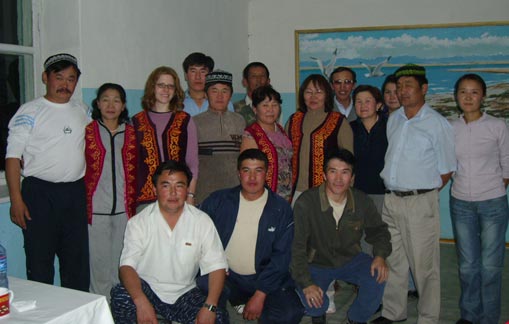
Improving Data Use in Mongolia
(February 2008) In 2007, program officers at United Nations Population Fund (UNFPA) in Mongolia and at the National Statistical Office (NSO) of Mongolia asked the Population Reference Bureau (PRB) to help them take advantage of a rich but little-used store of data on social programs. In particular, they wanted to help mid-level policymakers and program planners better use data to create policies and to evaluate existing policies and programs.
With funding from UNFPA’s Mongolia office and the Fred H. Bixby Foundation, PRB’s Erin Sines, policy analyst, and Lori Ashford, technical director of policy information, were able to help the NSO find out whether or how their data were being used and to devise a plan to enhance data use. PRB, NSO, and UNFPA brought together policymakers, researchers, and program planners from various regions for several days to discuss barriers to using data and ways to address them.

(c) 2007.
PRB Policy Analyst Erin Sines (third from left) led training sessions in Mongolia for policymakers and program
planners from Mongolia’s National Statistical Office and the western province of Bayan-Olgii.
These meetings were part of training sessions led by PRB in September and October 2007. In Ulaanbaatar, Sines trained a group of population and reproductive health experts from various agencies in Mongolia to lead the data use meetings. In a province in western Mongolia, PRB held a workshop in which health, education, finance, statistics, and social welfare officials from five provinces shared their data use experiences and challenges. In October 2007, Sines and Ashford held a workshop to improve data use and policy communication skills. PRB has held similar workshops in many other developing countries, including Kenya, Vietnam, the Philippines, and Costa Rica.
Identifying Gaps in the Flow of Data
In Mongolia, PRB used an “information mapping” exercise to help NSO analyze data use. Participants were divided into groups by sector, such as health, education, and labor. Each group chose one kind of data, indicator, or information system it uses or collects. The groups then mapped how the data were collected at the most local level. Who collected it and how? Who sent it to the next level? When did analysis occur? The map ultimately traced a history of who did what with the data at each level of government up to the highest levels.
The workshops revealed challenges related to collecting and using data. Sometimes just sending data from the local level to higher levels of government posed a challenge. In one case, data was supposed to be on paper and arrive by mail by the same time each month. Unfortunately, with uneven postal service and looming deadlines, local officials often entrusted the reports to long-distance truckers, tourist van drivers, or others en route to the capital, Ulaanbaatar. Sometimes the materials arrived late or not at all. To solve this problem, the local official at the workshop asked for a fax machine.
Even when information flows up to higher levels of government, it doesn’t always flow back down to the people who could use it most locally. “People at the local levels work hard to collect the data,” says Sines, who led the mapping exercise. “But there’s often no feedback from the top back down to the local level.” Finding and Using Relevant Data.
Data that do reach the right destination are not always used. During the workshops, higher-level officials shared reasons they do not use available data. Sometimes they do not trust its accuracy. Or, they do not know how to find relevant data to answer policy-related questions. At the end of the workshop, participants identified the following steps as priorities for improving data use:
- Improve the capacity of officials at the local level to collect and analyze data.
- Improve sharing of information between agencies from the regional and local levels.
- Improve accessibility of information.
- Improve feedback from national organizations to those who collect the data at the local level.
Although PRB trainers have long since returned home, the work to improve data use in Mongolia continues. As a next step, some of the national experts PRB trained will run regional meetings to improve communication and data use in the Mongolian provinces. UNFPA and NSO will use the information gathered from the meetings to design more training sessions, make recommendations for changes in policy, and develop new ways to effectively disseminate information.
